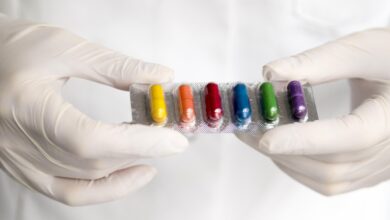Driving Success in Pharma Marketing: Harnessing Marketing Technology

The Evolving Landscape of Pharma Marketing
Introduction to Marketing Technology in Pharmaceuticals
The pharmaceutical industry is undergoing a significant transformation as it adopts marketing technology (martech) to enhance its promotional strategies. Martech includes a range of tools and software designed to optimize marketing processes, engage customers, and personalize communication. The use of these technologies in the pharmaceutical sector is driven by the need to comply with stringent regulations, cater to an increasingly digital customer base, and gain a competitive edge in a crowded market. As pharmaceutical companies embrace data-driven marketing in pharmaceuticals, the role of martech becomes pivotal in leveraging insights to drive marketing decisions and outcomes.
The Convergence of Martech and Adtech in Pharma
In recent years, there has been a notable convergence of marketing technology (martech) and advertising technology (adtech) across all of marketing and especially within pharma. This confluence is transforming how pharma marketers reach out to healthcare professionals and patients. Martech focuses on creating and managing engaging content, while adtech emphasizes the buying and selling of ad space and optimizing advertising campaigns. The integration of these two domains enables pharma marketers to deliver more cohesive and personalized experiences across various channels.
The convergence is also evident in the rise of programmatic advertising in pharma, which automates the decision-making process of media buying by targeting specific audiences and demographics. Programmatic advertising ensures that marketing messages are more relevant, timely, and efficient, leading to better campaign performance.
Moreover, with the incorporation of AI in pharmaceutical marketing, the potential for predictive analytics and machine learning to refine marketing strategies is becoming a reality. AI enhances the capabilities of both martech and adtech by providing deeper insights into customer behavior, optimizing campaign delivery, and personalizing interactions at scale.
The synergy between martech and adtech is paving the way for a more integrated approach to pharmaceutical marketing, where every touchpoint and interaction can be measured, analyzed, and improved upon. This harmonious integration is essential for pharma marketers aiming to navigate the complexities of the digital landscape and achieve a higher return on investment (ROI) for their marketing efforts.
By understanding and harnessing the power of marketing technology in pharmaceuticals, companies can better engage with their audiences, comply with industry regulations, and stay ahead in an ever-evolving marketplace. As these technologies continue to advance, the potential for innovation in pharma marketing grows, promising more effective and efficient ways to connect with healthcare professionals and patients alike.
Key Components of Marketing Technology
As the pharmaceutical industry navigates through an era of digital transformation, marketing technology plays an integral role. For pharma marketers, understanding the key components of marketing technology is essential for driving success and staying ahead in a competitive landscape.
Data Management Platforms (DMPs)
Data Management Platforms (DMPs) are the backbone of data-driven marketing in pharmaceuticals. These platforms collect, organize, and analyze large sets of data from various sources, enabling marketers to gain a comprehensive view of their audience. DMPs help in identifying patterns, segmenting audiences, and optimizing targeting strategies for better engagement.
By leveraging DMPs, pharmaceutical companies can:
- Aggregate patient and healthcare provider (HCP) data from multiple channels
- Create targeted marketing campaigns with precision
- Measure the effectiveness of promotional activities
The implementation of DMPs should be done with a keen understanding of regulatory compliance and data privacy standards. More on how DMPs revolutionize data-driven marketing in pharmaceuticals can be found in our detailed article.
Customer Relationship Management (CRM) Systems
Customer Relationship Management (CRM) systems are crucial for managing interactions with both existing and potential customers. In the context of pharmaceutical marketing, CRM systems help in organizing information regarding HCPs, patients, and other stakeholders.
Key functionalities of CRM systems include:
- Tracking communications and engagements
- Managing sales and marketing activities
- Personalizing content delivery based on user preferences and behaviors
The adoption of CRM systems enables pharmaceutical companies to maintain long-lasting relationships with their customers, streamline communication processes, and ultimately improve customer satisfaction.
Analytics and Reporting Tools
Analytics and reporting tools are indispensable for interpreting data and measuring the impact of marketing efforts. These tools provide actionable insights that guide decision-making and strategy refinement.
With the help of analytics tools, marketers can:
- Monitor campaign performance in real-time
- Calculate return on investment (ROI)
- Understand customer journeys and conversion paths
By harnessing the power of analytics, pharma marketers can optimize their marketing strategies, justify budgets, and demonstrate the value of their marketing initiatives. For insights into the role of analytics in enhancing marketing strategies, visit our article on ai in pharmaceutical marketing.
The integration of DMPs, CRM systems, and analytics tools forms the foundation of effective marketing technology in pharmaceuticals. These components, when used synergistically, enable pharma companies to navigate the marketing landscape with agility and precision. As the industry continues to evolve, staying abreast of advancements in pharma marketing automation and programmatic advertising in pharma is crucial for success.
Marketing Technology Challenges in Pharma
The pharmaceutical industry’s adoption of marketing technology presents unique challenges that must be navigated with care. Regulatory hurdles and concerns regarding data privacy and security are at the forefront of these obstacles.
Regulatory Hurdles
In the realm of pharmaceuticals, marketing is a tightly regulated field. The Food and Drug Administration (FDA) and other regulatory bodies have stringent guidelines on how drugs can be marketed to both healthcare professionals and consumers. Marketing technology in pharmaceuticals must be capable of ensuring compliance with these regulations, which can include restrictions on communication, claims made about products, and transparency requirements.
For instance, any promotional material must be backed by scientific evidence, provide a balanced view of risks and benefits, and include specific disclaimers. The use of marketing technology should enhance the accuracy and compliance of these messages, not complicate them.
| Regulation | Description |
|---|---|
| DTC Advertising | Direct-to-Consumer advertising must include risk information. |
| Off-Label Marketing | Promoting uses not approved by the FDA is prohibited. |
| Transparency | Payments to healthcare professionals must be disclosed. |
Adopting pharma marketing automation requires careful implementation to ensure that automated systems are always up-to-date with the latest regulatory changes.
Data Privacy and Security
Data privacy and security are paramount in the pharmaceutical industry, particularly when handling sensitive patient information. Marketing technologies such as Data Management Platforms (DMPs) and Customer Relationship Management (CRM) systems must be secure against breaches and comply with healthcare-specific regulations like the Health Insurance Portability and Accountability Act (HIPAA) in the United States.
Handling and storing data in compliance with global data protection regulations, such as the General Data Protection Regulation (GDPR) for European customers, adds another layer of complexity. Pharmaceutical marketers need to ensure that their marketing technology platforms have robust security measures in place and are capable of managing consent for data use in a transparent manner.
Given the importance of data in data-driven marketing in pharmaceuticals, the industry must invest in secure and compliant data management practices. This includes securing data transfer channels, encrypting sensitive information, and regularly auditing data access and usage.
| Data Type | Privacy Consideration |
|---|---|
| Patient Health Information | Must be handled in compliance with HIPAA. |
| Personally Identifiable Information | Subject to GDPR and other privacy regulations. |
| Usage Data | Needs to be anonymized and securely processed. |
As pharma marketers harness marketing technology to drive forward programmatic advertising in pharma and other advanced strategies like AI in pharmaceutical marketing, they must remain vigilant about these data privacy and security challenges. Addressing these issues head-on is essential for the responsible and successful use of marketing technology in the pharmaceutical industry.
Benefits of Marketing Technology for Pharma
The integration of marketing technology in the pharmaceutical industry unlocks numerous benefits that can lead to more efficient and effective marketing strategies. By leveraging various tools and systems, pharma marketers can enhance targeting and personalization, improve measurement and ROI, and streamline omnichannel strategies.
Enhanced Targeting and Personalization
Marketing technology enables pharmaceutical companies to segment their audiences more finely and tailor messages to specific groups. Data management platforms (DMPs) collect and analyze vast amounts of data, facilitating the creation of detailed customer profiles. These profiles assist marketers in delivering personalized content that resonates with individual preferences and needs, ultimately leading to higher engagement rates.
By utilizing pharma marketing automation tools, companies can automate these personalized interactions, ensuring that the right message reaches the right person at the right time, thus increasing the probability of conversion.
Improved Measurement and ROI
One of the most significant advantages of marketing technology is its ability to track and analyze the performance of marketing campaigns in real-time. Analytics and reporting tools provide valuable insights into campaign effectiveness, customer behavior, and market trends. This data-driven approach enables marketers to make informed decisions, optimize campaigns on the fly, and demonstrate a clear return on investment (ROI).
Pharmaceutical companies can now attribute sales and engagement to specific marketing activities, shedding light on what works and what doesn’t. This precision in measurement helps allocate marketing spend more effectively, maximizing ROI. To explore how data is transforming the industry, read about data-driven marketing in pharmaceuticals.
Streamlining Omnichannel Strategies
Omnichannel marketing is essential in today’s fragmented media landscape. Marketing technology facilitates the integration of various channels, ensuring a consistent and cohesive customer experience. Customer relationship management (CRM) systems play a critical role in orchestrating omnichannel strategies, allowing for seamless interactions whether the customer is engaging online, through mobile apps, or offline channels.
Integration of channels enables a unified view of the customer journey, ensuring that messaging is relevant and consistent across touchpoints. This approach not only improves customer satisfaction but also strengthens brand loyalty and increases the effectiveness of marketing efforts.
Pharmaceutical marketers must remain agile in a rapidly changing environment. The use of tools such as programmatic advertising in pharma and AI in pharmaceutical marketing can provide the agility necessary to adapt to new channels and customer expectations, ensuring the longevity and success of omnichannel strategies.
By harnessing the power of marketing technology, pharmaceutical companies can achieve a competitive edge, driving success in their marketing efforts. The ability to personalize communication, measure impact accurately, and deliver a seamless omnichannel experience are just a few of the transformative benefits that marketing technology offers to the pharmaceutical industry.
Implementing Marketing Technology in Pharma
The pharmaceutical industry is increasingly recognizing the importance of marketing technology in driving success. Implementation of these technologies can be complex, requiring careful planning, training, and integration. Here we discuss best practices for adoption, the importance of training and skill development, and the integration with existing systems and workflows in pharma marketing.
Best Practices for Adoption
Adopting marketing technology within the pharmaceutical sector should be done with a strategic, patient-centric approach. It’s imperative to align martech tools with business objectives and the regulatory environment distinctive to the pharma industry.
- Assess Needs and Goals: Begin with a thorough assessment of the organization’s specific needs, marketing goals, and regulatory considerations.
- Select Appropriate Tools: Choose tools that offer scalability, compliance, and the ability to handle complex data sets inherent in pharma marketing.
- Create a Cross-Functional Team: Involve stakeholders from various departments such as marketing, IT, sales, and legal to ensure broad support and understanding.
- Pilot Programs: Before full-scale implementation, pilot programs help in assessing the effectiveness of chosen martech solutions and allow for adjustments.
- Continuous Compliance Checks: Ensure that all marketing technology adheres to industry regulations at every step of the implementation process.
Best practices also involve staying informed about the latest trends and innovations, such as AI in pharmaceutical marketing, which can significantly enhance the capabilities of marketing technology.
Training and Skill Development for Teams
The effectiveness of marketing technology depends largely on the people using it. Therefore, investing in training and skill development is crucial.
- Initial Training: Comprehensive training sessions should be conducted to familiarize teams with new tools and their functionalities.
- Ongoing Education: Continuous learning opportunities, such as workshops and webinars, should be provided to keep teams up-to-date with evolving technologies.
- Certification Programs: Encouraging staff to undertake certification programs in marketing technology can build a highly skilled workforce.
- Cross-Training: Cross-training between departments can foster a more collaborative and integrated approach to using marketing technology.
Proper training ensures that teams can leverage tools like pharma marketing automation effectively, enhancing productivity and campaign success.
Integration with Existing Systems and Workflows
Seamless integration of marketing technology with current systems and workflows is vital for minimizing disruption and maximizing efficiency.
- Audit Existing Systems: Conduct an audit of existing systems to identify potential compatibility issues or gaps that martech can fill.
- Develop an Integration Plan: Outline a clear plan for how new tools will fit within the existing technological framework.
- Data Migration: Ensure secure and accurate migration of data from legacy systems to new platforms.
- Workflow Adaptation: Adjust workflows as needed to accommodate new tools and processes without sacrificing productivity.
- Monitor and Optimize: Continuously monitor the integration process and make necessary optimizations to workflows and systems.
By considering these aspects, pharmaceutical companies can streamline their marketing efforts and enhance their overall strategy with tools such as data-driven marketing in pharmaceuticals and programmatic advertising in pharma.
Implementing marketing technology in pharmaceuticals is a journey that requires careful planning, commitment to training, and meticulous integration. By embracing best practices and focusing on the seamless adoption of new technologies, pharma marketers can achieve a competitive edge and drive meaningful engagement with healthcare professionals and patients alike.
Future of Marketing Technology in Pharma
As the pharmaceutical industry continues to evolve, marketing technology plays a pivotal role in shaping the future of how companies engage with healthcare professionals, patients, and stakeholders. The upcoming trends and the role of innovation are key areas to focus on to drive marketing success in this sector.
Trends Shaping the Future
The pharmaceutical marketing landscape is being transformed by several emerging trends facilitated by the advancement of marketing technology. These trends are likely to dictate the strategies and tools that will be at the forefront of pharma marketing in the years to come.
- Artificial Intelligence and Machine Learning: AI and ML are revolutionizing data-driven marketing in pharmaceuticals, providing deeper insights into customer behavior and enabling predictive analytics for more strategic decision-making.
- Programmatic Advertising: The use of programmatic advertising in pharma is expected to grow, allowing for more precise targeting and real-time bidding in advertising spaces, thus optimizing marketing spend.
- Omnichannel Engagement: With an emphasis on providing a seamless customer experience, omnichannel strategies are becoming more sophisticated, leveraging multiple channels to engage with audiences in a consistent and effective manner.
- Personalization at Scale: Advances in technology are making it possible to deliver personalized content and communications at scale, a critical aspect in a field where individual needs and responses to treatments can vary greatly.
- Compliance and Data Security: Technologies that ensure compliance with regulatory requirements and protect sensitive patient data will become increasingly important as digital interactions proliferate.
- Blockchain: Emerging applications of blockchain technology promise to enhance trust and transparency in pharma marketing efforts, particularly in the tracking of consents and ensuring data integrity.
The Role of Innovation in Pharma Marketing Success
Innovation in marketing technology is not just about adopting new tools; it’s about fundamentally rethinking how to engage with customers and measure the impact of marketing efforts. Success in this arena requires both a cultural shift and a strategic approach to technology adoption.
- Enhancing Customer Experience: Innovative marketing technology offers the potential to dramatically improve the customer experience, whether it’s through interactive platforms, personalized communication, or streamlined services.
- Agility and Flexibility: The ability to quickly adapt to changes in the market, regulatory environment, and customer behavior is facilitated by agile marketing technologies that can be updated and scaled as needed.
- Integrating with Traditional Channels: The integration of new technologies with traditional marketing channels is vital to creating a unified strategy that leverages the strengths of each medium.
- Measuring Impact: Advances in analytics and reporting tools will continue to refine how pharma marketers measure the impact of their campaigns, ensuring that they can demonstrate a clear return on investment.
Innovation in marketing technology empowers pharmaceutical companies to navigate a rapidly changing landscape with confidence. By staying abreast of these trends and embracing change, pharma marketers can ensure that their strategies remain effective and compliant, thus driving the industry forward. For more insights into leveraging technology in pharma marketing, explore our articles on pharma marketing automation and ai in pharmaceutical marketing.





